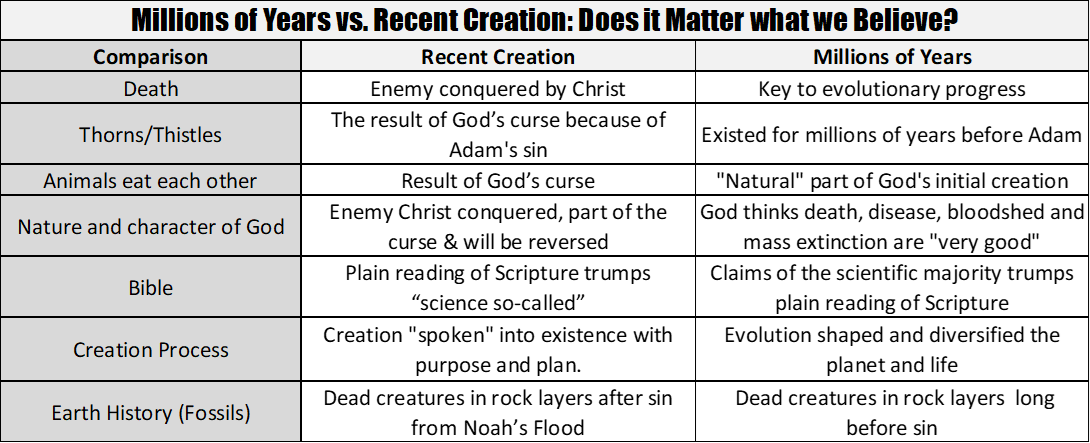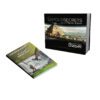No products in the cart.
Return To ShopEvolution: Can I be a Christian and Still believe in Evolution and Millions of Years?
A delicate question we receive sometimes is, “Can a person be a Christian but still believe in evolution and millions of years?”
To understand the breadth of a complete answer to this question, one must understand what the Bible teaches about the nature and connection between Jesus, the Creation, and the Word/Logos. Scripturally speaking, there is some deep exploring that can be done between the connection of these three. In short, Jesus is Lord, Creator, and the “Word” (Logos) incarnate. In introduction of these complex and deep issues can be found in Genesis 1, John 1, and Colossians 1:15-18. If one really wants an answer to this topic, don’t skip reading these.
On a practical level, there are two things that can be said about this topic.
First, if you want to get to know Jesus better, read his Word. If you want to love Jesus, hold and keep his Word (see John 14:23-24: “Jesus answered and said unto him, If a man love me, he will keep my words: and my Father will love him, and we will come unto him, and make our abode with him. He that loveth me not keepeth not my sayings: and the word which ye hear is not mine, but the Father’s which sent me.”) The word used for “keep/keepeth” my sayings means, “to attend to carefully, take care of, to guard, to observe, and to reserve. And because Jesus ‘wrote’ Genesis (as the Logos), this includes that book too. If someone who says they are a Christian wants to grow in their relationship with Christ, read the Word and allow it’s transformative power to renew and shape your mind (Romans 12, Hebrews 4:12), including what the Word consistently says about Creation.
Second, as our trust and intimacy with the Lord Jesus and His Word grows, it starts to replace the things of this world, including what we’ve learned in the past and the beliefs that we hold that are contrary to God’s Word. As the Holy Spirit grows stronger and our clutches to this world grow weaker, He expands our understanding about theology, creation, and history. We know of many who became Christians at an early age, but only grew to a fuller understanding about Genesis 1-11 being real history (as plainly written) only after years of study and humbling themselves under the authority of God’s Word, not man’s. A person who professes to be a Christian and really is one will start showing signs of a renewed mind (Romans 12) and transformed life (James 2). Both should be present in someone’s life to reflect true redemption by our Creator.
With the above stated, a deep or even cursory review of Scripture reveals a very consistent presentation about Creation. Even the Fourth Commandment (Exodus 20:11), written by God’s own hand, specifies that he created the “Heavens, Earth, Sea, and all that is in them.” This same or similar statement echoes throughout Scripture: Nehemiah 9:6, Psalm 102:25, 146:6, Acts 4:24, 14:15, and Revelation 10:6.
The Bible plainly teaches that God created in six days as we would understand them. Every “day” of the six days in Genesis 1 are accompanied with the terms “evening,” “morning” and a “number,” and every time outside of Genesis “day” is used with any of these three qualifiers always means an ordinary day. What else would God have wanted the Israelites to believe when He wrote with His own hand in the fourth commandment: “For in six days the Lord made the heavens and the earth, the sea, and all that is in them, and rested the seventh day.” God could have created in a split second but He chose to create over a week so we would have a cycle and rhythm to live by.
What about the 6,000 year old earth? Where does that come from? The genealogies in Genesis clearly map to Adam who was created by God out of dust just thousands of years ago, and they are even affirmed by the New Testament writers.
Denying these fundamental truths—truths that even connect to the Gospel itself—result in many trying to fight their spiritual battles with broken swords. Because our actions and choices in life stem from what we believe, how effective can we be with our minds anchored into secular ideas rather than God’s Word? Inserting millions of years into the Bible—or anything else for that matter—begins a slippery slope. If truth does not start on the first page, when does it begin? How deeply will the Bible influence our lives if we pick and choose what it says about history? The impact of sin? The nature of God? The Bible is clear that God spoke creation into existence—He did not use evolution over millions of years. The table below easily demonstrate how our view of earth history and Scripture plays into several areas of our lives.



![[eBook] Thunderbirds and Flying Dragons: Giant Birds & Pterosaurs that Lived After the Flood](https://genesisapologetics.com/wp-content/uploads/2025/12/THUNDERBIRDS-PRODUCT-IMAGE-100x100.jpg)





